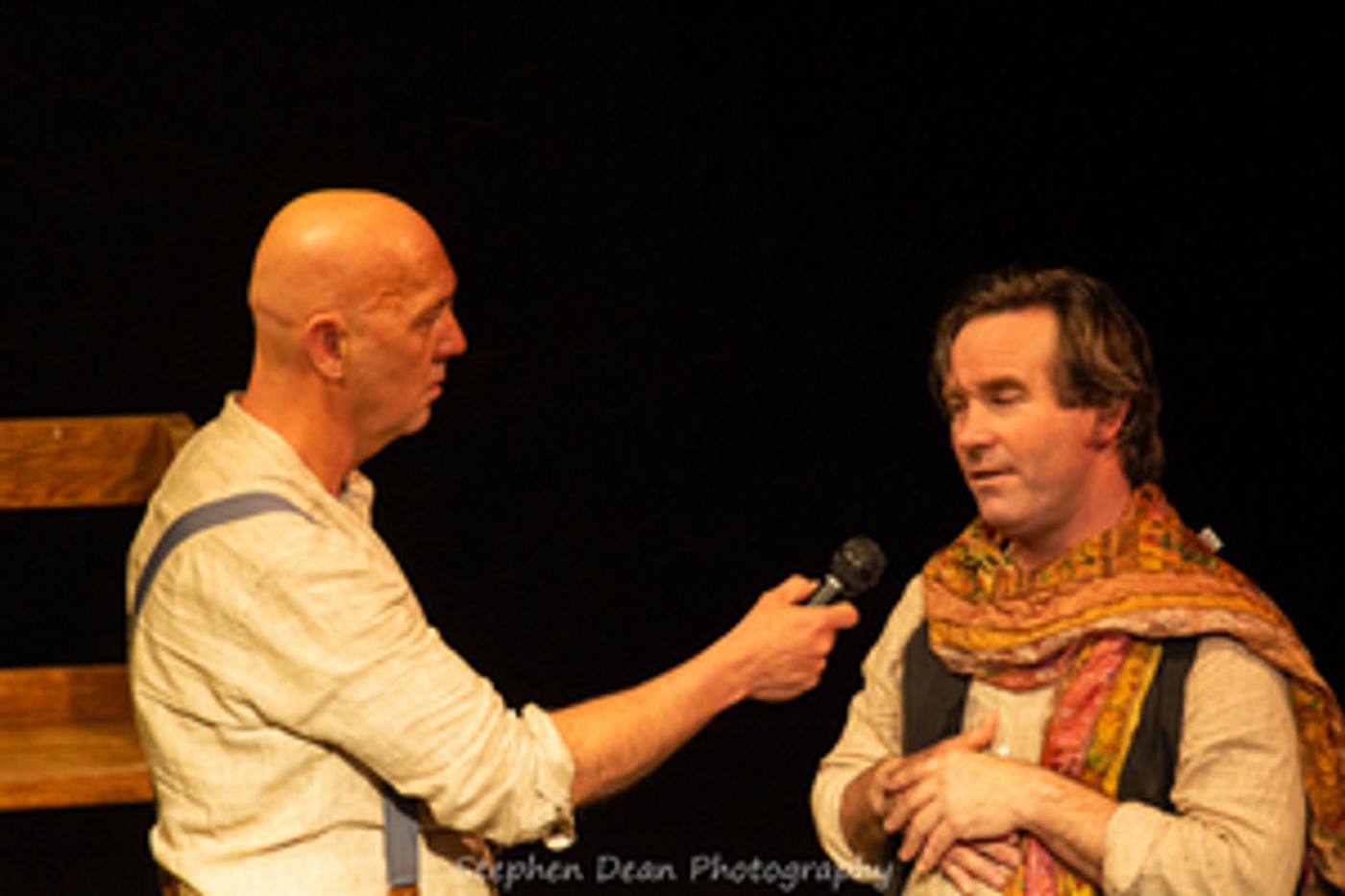Review: STONES IN HIS POCKETS at Bakehouse Theatre
Culture shock as America meets Ireland in this tragicomedy.
 Reviewed by Barry Lenny, Thursday 28th October 2021.
Reviewed by Barry Lenny, Thursday 28th October 2021.
Joh Hartog is one of the regular users of the much-loved Bakehouse Theatre which, sadly and infuriatingly, will be closing in the early months of next year because the church group next door that bought it refuses to renew the lease. With a constant string of productions year round, and being a popular Fringe venue, it will be greatly missed. In the meantime, Hartog has brought another well-written, Olivier Award-winning play to us in the tragicomedy, Stones in His Pockets, a 1996 two-hander, written by Marie Jones, in which Brendan Cooney and Scott Nell play all fifteen characters, male and female.
Set in rural County Kerry in 1996, the Hollywood machine arrives in Ireland to shoot a new film, The Quiet Valley, hiring most of the locals as extras. The two central characters, Jake Quinn, and Charlie Conlon, meet on the set and strike up a friendship.
Charlie's small business, a video shop in the seaside town of Ballycastle, County Antrim, Northern Ireland, 80km north of Belfast, has been wiped out by competition from Extra Vision, a major video lending company. He has escaped that past by travelling to the opposite end of Ireland. He is in it for the good money, £40 a day, and for the free food, regularly trying to con the caterers out of second helpings of dessert. He is primarily hoping, though, to convince the film company to accept a script that he has written. Jake, on the other hand, has been to America but, being disillusioned and homesick, has returned to his home in County Kerry. While Charlie is eternally optimistic, Jake is a pragmatic realist.
The key turning point in the play is the suicide of teenager, Sean Harkin, who fills his pockets with stones to weigh himself down and walks into the local lake. He was humiliated by Caroline Giovanni, the beautiful American star who cannot even get close to faking an Irish accent, who had her Scottish minder throw him out of the local pub. The reactions of the community, especially his best friend, Fin, and the septuagenarian, Mickey, affect the remainder of the play. Mickey, the last surviving extra from that famous film, The Quiet Man, is especially upset when he hears that the film people expect the wake to be teetotal, so that all of the extras who are attending the funeral can quickly return after the funeral, ready to go back to work. Mickey, of course, defiantly returns blind drunk.
It turns out that Ireland does not conform to the picture that the Americans had in their imaginations, and the Americans are not what the Irish expected, either. Fed up with the film folk, Jake and Charlie decide to rewrite Charlie's script telling Sean's story, which they intend to call Stones in His Pockets.
There were plenty of laughs in the witty script, and in the interpretations of the many characters, juxtaposed against the more serious and poignant passages. Character changes were carried out with only minor costume changes, the rest relying on changes to physicality, facial expressions, and voices. Cooney fared well, particularly as the American star, tossing her long scarf over her shoulder and flicking her hair back, flirting with Jake in the hope of capturing his accent, and as the belligerent Scottish heavy. Nell, however, excelled, with some vastly different characterisations, from the bent-over old man, Mickey, to donning a headset and flouncing about the stage to become the young, female, third assistant director, Aisling, then to reversing his flat cap and becoming the drug addled teenager, Sean.
The biggest laughs, unfortunately, were unintentional, with Cooney forgetting his lines, being dutifully fed them by Nell and then, rather than accepting the assistance and attempting to cover the mistake, making it obvious, dropping out of character, even breaking the fourth wall and grinning at the audience, then 'corpsing', and causing Nell to collapse, too. Most of the audience found it humorous but, when Cooney continued to forget his lines, and then make much of it in the same manner, I found it all very unprofessional, detracting from the performance. One hopes that the director will be having words.
Tammy Boden's set consists of a large rock, a raised bit of ground retained by a low wall, a long church pew, and a couple of small benches, the floor divided into a grassed part and a timber part, all representing the many locations. She was also responsible for the minimal costuming that allowed the rapid change of characters. Stephen Dean's lighting does much to create the many scenes, illuminating various sections or the entirety of this set, and cleverly establishing interiors, exteriors, and the time of day. He was also in charge of the sound, which, of course, included considerable amounts of Irish traditional music, jigs and reels which, since I play that music myself, were pleasantly familiar.
There is much to like in this production and, with luck, the nonsense can be overcome to make it far more enjoyable.
Photography, Stephen Dean.
Reader Reviews
Videos
